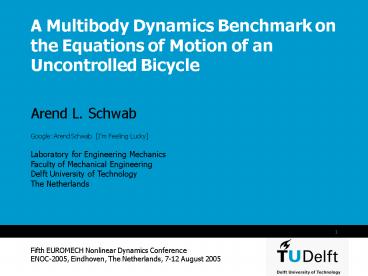A Multibody Dynamics Benchmark on the Equations of Motion of an Uncontrolled Bicycle - PowerPoint PPT Presentation
1 / 36
Title:
A Multibody Dynamics Benchmark on the Equations of Motion of an Uncontrolled Bicycle
Description:
Cornell University, Ithaca, NY, 1987: Yellow Bike in the Car Park. Aug 9, 2005. 5. Experiment ... Add a controller to the instrumented bicycle - robot bike. ... – PowerPoint PPT presentation
Number of Views:390
Avg rating:3.0/5.0
Title: A Multibody Dynamics Benchmark on the Equations of Motion of an Uncontrolled Bicycle
1
A Multibody Dynamics Benchmark on the Equations
of Motion of an Uncontrolled Bicycle
Arend L. Schwab Google Arend Schwab Im
Feeling Lucky
Laboratory for Engineering MechanicsFaculty of
Mechanical Engineering Delft University of
Technology The Netherlands
- Fifth EUROMECH Nonlinear Dynamics
ConferenceENOC-2005, Eindhoven, The Netherlands,
7-12 August 2005
2
Acknowledgement
- TUdelft
- Jaap Meijaard 1
- Jodi Kooiman
Cornell University Andy Ruina Jim Papadopoulos
2 Andrew Dressel
- School of MMME, University of Nottingham,
England, UK - PCMC , Green Bay, Wisconsin, USA
3
Motto
Everybody knows how a bicycle is constructed
yet nobody fully understands its operation!
4
Experiment
Cornell University, Ithaca, NY, 1987 Yellow Bike
in the Car Park
5
Experiment
Cornell University, Ithaca, NY, 1987 Yellow Bike
in the Car Park
6
Some Advice
Dont try this at home !
7
Contents
- Bicycle Model
- Equations of Motion
- Steady Motion and Stability
- Benchmark Results
- Experimental Validation
- Conclusions
8
The Model
- Modelling Assumptions
- rigid bodies
- fixed rigid rider
- hands-free
- symmetric about vertical plane
- point contact, no side slip
- flat level road
- no friction or propulsion
9
The Model
4 Bodies ? 46 coordinates(rear wheel, rear
frame (rider), front frame, front
wheel) Constraints3 Hinges ? 35 on
coordinates2 Contact Pnts ? 21 on
coordinates ? 22 on velocities
Leaves 24-17 7 independent Coordinates,
and 24-21 3 independent Velocities (mobility)
The system has 3 Degrees of Freedom,
and 4 (7-3) Kinematic Coordinates
10
The Model
3 Degrees of Freedom
4 Kinematic Coordinates
Input File with model definition
11
Eqns of Motion
For the degrees of freedom eqns of motion
and for kinematic coordinates nonholonomic
constraints
State equations
with
and
12
Steady Motion
Steady motion
Stability of steady motion by linearized eqns of
motion
and linearized nonholonomic constraints
13
Linearized State
State equations
Green holonomic systems
Linearized State equations
with
and
and
14
Straight Ahead Motion
Upright, straight ahead motion
Turns out that the Linearized State eqns
15
Straight Ahead Motion
Linearized State eqns
Moreover, the lean angle j and the steer angle
d are decoupled from the rear wheel rotation qr
(forward speed ), resulting in
with
16
Stability of Straight Ahead Motion
Linearized eqns of motion for lean and steering
with and a constant
forward speed
For a standard bicycle (Schwinn Crown)
17
Root Loci
Parameter forward speed
v
v
v
Stable forward speed range 4.1 lt v lt 5.7 m/s
18
Check Stability
by full non-linear forward dynamic analysis
forward speedv m/s
6.3
4.9
4.5
3.68
3.5
1.75
0
Stable forward speed range 4.1 lt v lt 5.7 m/s
19
Comparison
A Brief History of Bicycle Dynamics Equations
- 1899 Whipple- 1901 Carvallo- 1903 Sommerfeld
Klein- 1948 Timoshenko, Den Hartog- 1955
Döhring- 1967 Neimark Fufaev- 1971 Robin
Sharp- 1972 Weir- 1975 Kane- 1983 Koenen-
1987 Papadopoulos - and many more
20
Comparison
For a standard and distinct type of bicycle
rigid rider combination
21
Compare
Papadopoulos (1987) with Schwab (2003) and
Meijaard (2003) 1 Pencil Paper 2
SPACAR software 3 AUTOSIM software
Relative errors in the entries in M, C and K are
lt 1e-12 Perfect Match!
22
Experimental Validation
Instrumented Bicycle, uncontrolled
- 2 rate gyros
- lean rate
- yaw rate
- 1 speedometer
- -forward speed
- 1 potentiometer
- -steering angle
- Laptop Labview
23
Experimental Validation
Linearized stability of the Uncontrolled
Instrumented Bicycle
Stable forward speed range 4.0 lt v lt 7.8 m/s
24
An Experiment
25
Measured Data
26
Extract Eigenvalues
Stable Weave motion is dominant
Nonlinear fit function on the lean rate
27
Extract Eigenvalues Compare
l2 5.52 rad/s l1 -1.22 rad/s forward
speed 4.9 lt v lt5.4 m/s
Nonlinear fit function on the lean rate
28
Compare around critical weave speed
29
Just below critical weave speed
30
Compare at high and low speed
31
Conclusions
- The Linearized Equations of Motion are Correct.
Future Investigation
- Add a controller to the instrumented bicycle -gt
robot bike. - Investigate stability of steady
cornering.
32
MATLAB GUI for Linearized Stability
33
Myth Folklore
A Bicycle is self-stable because
- of the gyroscopic effect of the wheels !?
- of the effect of the positive trail !?
Not necessarily !
34
Myth Folklore
Forward speedv 3 m/s
35
Steering a Bike
To turn right you have to steer
briefly to the LEFT and then let go of the
handle bars.
36
Steering a Bike
Standard bike with rider at a stable forward
speed of 5 m/s, after 1 second we apply a steer
torque of 1 Nm for ½ a secondand then we let go
of the handle bars.
37
Conclusions
- The Linearized Equations of Motion are
Correct. - A Bicycle can be Self-Stable even
without Rotating Wheels and with Zero Trail.
Future Investigation
- Validate the modelling assumptions by means of
experiments. - Add a human controller to the
model. - Investigate stability of steady
cornering.































